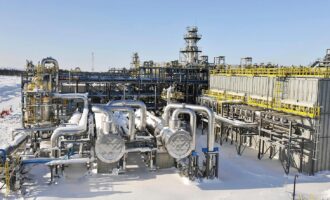
bp cuts ties with Rosneft following Russian invasion of Ukraine
bp on Sunday announced that it will exit its shareholding in Rosneft following Russia’s invasion of Ukraine last Thursday. bp has held a 19.75% shareholding in PJSC Rosneft Oil Company, a Russian integrated energy company headquartered in the Russian capital of Moscow, since 2013. Rosneft accounts for around half of bp’s oil and gas reserves and a third of its production. The divestment will result in charges of up to USD25 billion.
Additionally, bp announced that Bernard Looney, bp chief executive officer, is resigning from the board of Rosneft with immediate effect. The other Rosneft director nominated by bp, former bp Group Chief Executive Bob Dudley, is similarly resigning from the Rosneft board.
The resignations will require bp to change its accounting treatment of its Rosneft shareholding and, as a result, it expects to report a material non-cash charge with its first quarter 2022 results, to be reported in May.
The move by the British energy major follows an outpouring of outrage all over the world over the unprovoked invasion of Ukraine by Russian military forces, leading to the loss of at least a thousand lives of Ukrainian civilians in just a matter of days. Several countries, including the United States, Britain and Canada, as well as the European economic bloc, have imposed economic sanctions on Russia, Russian banks and individuals, and pledged to supply Ukraine with military arms to help combat Russian forces.
“Russia’s attack on Ukraine is an act of aggression which is having tragic consequences across the region. bp has operated in Russia for over 30 years, working with brilliant Russian colleagues. However, this military action represents a fundamental change. It has led the bp board to conclude, after a thorough process, that our involvement with Rosneft, a state-owned enterprise, simply cannot continue. We can no longer support bp representatives holding a role on the Rosneft board. The Rosneft holding is no longer aligned with bp’s business and strategy and it is now the board’s decision to exit bp’s shareholding in Rosneft. The bp board believes these decisions are in the best long-term interests of all our shareholders,” bp Chair Helge Lund said.
Looney added: “Like so many, I have been deeply shocked and saddened by the situation unfolding in Ukraine and my heart goes out to everyone affected. It has caused us to fundamentally rethink bp’s position with Rosneft. I am convinced that the decisions we have taken as a board are not only the right thing to do, but are also in the long-term interests of bp. Our immediate priority is caring for our great people in the region and we will do our utmost to support them. We are also looking at how bp can support the wider humanitarian effort.”
Looney has been a director of Rosneft as one of two bp-nominated directors since 2020. Dudley has been a director of Rosneft since 2013.
Impact on reporting and finances
As a result of the resignations of bp’s nominated directors, bp has determined that it no longer meets the criteria set out under International Financial Reporting Standards (IFRS) for having “significant influence” over Rosneft. bp will therefore no longer equity account for its interest in Rosneft, treating it now as a financial asset measured at fair value.
This will result in two material changes to bp’s financial reporting and finances in the results for the first quarter of 2022.
First, it is expected to give rise to a non-cash adjusting item charge at the time of the first quarter 2022 results, representing the difference between the fair value of bp’s Rosneft shareholding at 31 March 2022 and the carrying value of the asset. At the end of 2021 this carrying value stood at around USD14 billion.
Second, in addition, the change is expected to result in non-cash adjusting item charge, principally arising from foreign exchange losses accumulated since 2013 that under IFRS were previously recorded directly in equity rather than the income statement. At the end of 2021 these totalled around USD11 billion, and this adjustment will not impact equity.
The change in accounting treatment also means that bp will no longer recognise a share in Rosneft’s net income, production and reserves. bp will no longer report Rosneft as a separate segment from the first quarter 2022 results.
bp will also exit its other businesses with Rosneft within Russia. This includes an interest in three joint ventures with a carrying value of around USD1.4 billion at year-end 2021.









